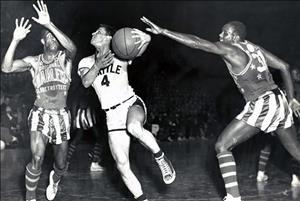On January 21, 1952, the Seattle University Chieftains stun the basketball world by defeating the Harlem Globetrotters 84-81 during an exhibition game at the University of Washington's Hec Edmundson Pavilion. Seattle University is led by John (b. 1931) and Ed (1931-2014) O'Brien, "gold dust twins" recruited from New Jersey by Chieftain coach Al Brightman in 1949. Other notable players on SU's integrated "United Nations team" include Wayne Sanford, Oscar Holden, and Ray Soo.
The Flyin' O'Briens
The Harlem Globetrotters were pioneers in demonstrating the prowess of African American basketball players. During national and international tours, they routinely played and dispatched local college teams. No one expected a different outcome when they met Seattle University's squad at a charity game hosted by jazz great Louis Armstrong. The Globetrotters were caught off guard by the O'Brien brothers' aggressive fast-break style and almost telepathic coordination on the boards.
SU's performance earned coverage in national magazines and an invitation to the team's first NCAA Tournament the following season, while the O'Briens were named All-American players in 1953. Johnny O'Brien became the first NCAA player to score more than 1,000 points in a season, and racked up a college career total of 2,733 points -- despite standing only 5-foot-9.
John and Ed O'Brien were also formidable players on the baseball diamond and Bing Crosby (a Chieftains fan despite graduating from SU's Jesuit rival Gonzaga University) arranged for them to play for the Pittsburgh Pirates. After leaving pro sports, Eddie O'Brien later returned to SU as its athletic director while Johnny entered politics and served several terms as a King County Commissioner.
Seattle University remained a major force in the NCAA for many years thanks to the skill of players such as Joe Pehanick, Elgin Baylor, Charlie Brown, Eddie Miles, and Tom Workman. Declining resources and team performance in the 1970s led Seattle University to withdraw from NCAA Division I competition in 1980, while SU's female hoopsters such as All-American Sue Turina earned new respect and national honors. The Chieftains name was retired in 2000 out of respect to Native Americans, and both SU men and women now compete as the Redhawks.

